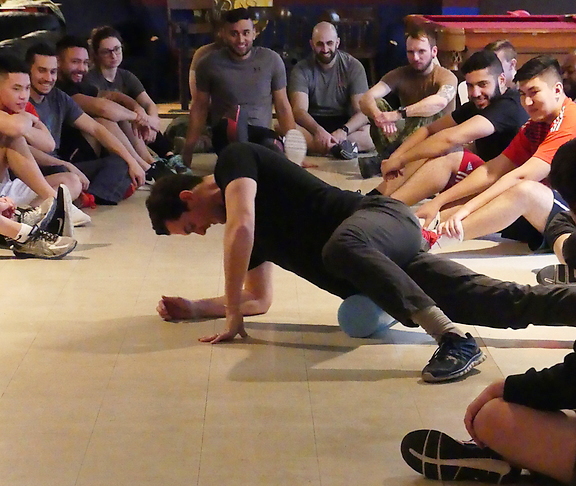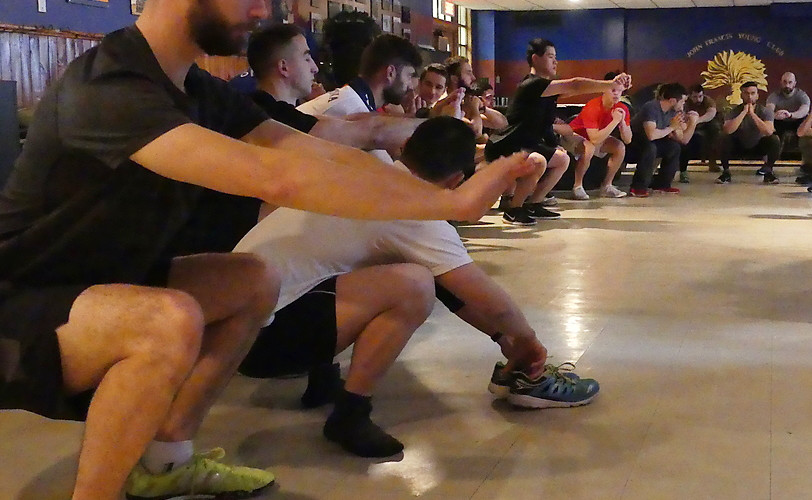- Dave Morrow

- Jan 7, 2019
- 4 min read
Updated: Feb 13, 2019
On December 15th, soldiers from the Canadian Grenadier Guards listened, participated and moved through a series of lessons and movement screens geared for the tactical athlete. As mentioned in a earlier post, the Tactical Athlete, is a concept that helps set the tone for a soldier's physical development plan.
With the demands of the every day soldier constantly increasing, the nature of the job of an infantryman is constantly evolving. However, with all the advancements in tech, it comes at an ever increasing cost to the weight borne by the individual soldier. With that being said, there is only so much an individual can carry before tactical effectiveness starts to suffer. This is outlined very well in the article by, Think Defence, that states that,
"When carrying heavy equipment it has been shown that overlooking visual clues to threats increases and decreases reaction times."
Additionally;
"Recent studies (Silk 2010) demonstrated an average decrease in soldier mobility performance of 1,5% for every 1kg carried. Another study (Basaan 2005) looked at the time to complete an obstacle course and found that for every 1kg increase in external load (between 15 and 42kg) the time to complete increased by just under 8 seconds."
The recommendations are pretty straight forward, with the average weight of a patrolman during the Afghan War at 123 lbs, three courses of action are available:
Make shit lighter
Carry less shit
Make the shit you're carrying, easier to carry (ie PT your guts out)
I can only affect point number three, so I'm going to stay in my lane on this one. Until the Army comes up with its new exoskeleton suit for the Reserves that will likely be made by the lowest bidder and function only for 10 mins on any given Sunday, don't neglect your body.
The point of our PT day was to scratch the surface on how to prepare and maintain your body for the rigours of infantry life but also, life in general. The analogy I use is like having a really nice race car that you only take out one weekend a month. During that month though, you forget to top up the oil, you don't rebalance your tires and you keep forgetting to tune up the suspension. All of a sudden it's weekend race day and you start racing at top speed. All goes well for a few months, maybe years but the lack of care eventually leads to blowing a tire, breaking a tie rod or your engine seizing up.
Same goes for your body.
A typical reservist is in school for 20 hrs a week plus another 20 or 30 studying. Most, if not all is done seated and most find very little time to train and worse, most are malnourished and dehydrated. All of a sudden it's time for a weekend patrolling exercise or worse, leadership training, and the increased demands on the body can lead to injury and long-term issues that contribute to a lower quality of life.
Now, imagine that someone comes along and explains how your level of fitness is not only imperative for your job performance but how you're going to live your life for the foreseeable future? Not only that, but this person has also lived it and knows the demands placed on our soldiers? You got it, that's where I step in.
From my experience, most infantry soldiers have concrete ankles, really immobile thoracic spines and dangerously stiff hip complexes. This can all lead to a train wreck of issues down the line, in my case it was herniation of my back. This is why during the seminar we worked on "prehab" and specific measures to improve mobility. The techniques are very basic but can make a massive difference for injury prevention when done consistently.
My three favourites are:
1. Anterior tibialis self myofascial release (SMR) with a lacrosse ball or foam roller as shown below:

2. Soleus SMR with your thumbs from your ankle all the way up your tibia (shin) to your knee:

3. Tensor Fascia Latae (TFL) & Sartorius SMR with a foam roller or lacrosse ball:

These helped me alleviate a huge shin splint problem I had after many ruck marches and long runs, additionally, it keeps your tissue mobile in the load bearing part of your body; kind of important for us infantry types. SMR is really similar to going to see a massage therapist (a real one, not the ones on St. Catherine's St.). It starts to realign the fascia, the interconenctive tissue that holds our musculature together. It can start to tighten up, massage brings increased blood flow and a realignment that is usually constantly needed. If you make a "pain face" while doing it, that means it's working. Keep at 'er every day until it no longer hurts.
In the infamous words of Sgt Barnes in Platoon;
"Take The PAIN!"
It was a real hoot heading back to my regiment for the first time since I've been out. I really enjoyed the experience and I hope the seminar proved to be worthwhile for all who participated. The images and content related to soldier related injury prevention, can be found in my new eBook, The Nimble Warrior, set for release on January 30th, 2019.
Pre sale for, The Nimble Warrior starts today and you can reserve your copy before it's even released right here at at a 25% discount.
All photos in slideshow courtesy of Cpl Raquel Bitton

















